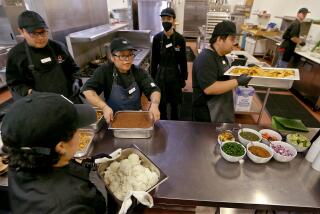At Chef School, Good Work Goes to Waist
- Share via
HYDE PARK, N.Y. — At the nation’s top culinary school, indulgence is unavoidable. Students taste-test every sumptuous dish, be it hollandaise sauce, duck-liver pa^te or creme bru^lee.
It’s no surprise that keeping lean in a field fraught with cream and pastries is tricky. But, increasingly, disciples of professional cooking are loath to have their bodies betray their business.
“I’m training for marathons, so it’s kind of sad to see my belly larger than it used to be,” complains Anthony Rabeni, who has attended the Culinary Institute of America since June. “In six weeks I gained 15 pounds.”
Fortunately for Rabeni, the school is taking to heart the physical and mental hazards inherent in professional cooking. Just 500 yards from the pastry kitchens, a $9.8-million recreation center now holds “butt and gut” classes. Stress management and fitness are required courses for students in the four-year program, whose tuition runs as much as $15,400 a year.
The Culinary Institute is not alone in noticing the pitfalls of workplaces filled with souffles and wines. In Providence, R.I., Johnson & Wales also opened a recreation center in the last year on its culinary school campus.
“They used to say, never trust a skinny chef,” says Jeff Levine, a spokesman for the Culinary Institute. “That’s just not true anymore.”
The drive for workout facilities came from both students and faculty. Previously the institute directed exercise-hungry students to the gym at Marist College, six miles away in Poughkeepsie.
In 1986 the school opened St. Andrew’s Cafe, a restaurant and classroom featuring four-course meals containing fewer than than 1,200 calories.
Students then made clear they expected the highly regarded cooking school to do something for their health as well as the health of diners, says John Campbell, associate dean of student activities and recreation.
Katherine Shepard, a chef-instructor who slimmed down 10 years ago when she began bicycling, says kitchen workers are learning they need to work off the delicacies that drew them to the job or risk their future.
“Younger chefs have taken it up to take care of themselves,” she says. “Otherwise, by the time you hit 45, your legs are shot and your back is shot.”
All this is not to say the Culinary Institute has undergone complete transformation. The school goes through 180 gallons of cream a week. The fitness message is less about moderation and more about working off what the body takes in.
“Unfortunately, part of the job is we have to taste what students make,” Shepard says. “The flip side is, you put in a little extra time at the gym.”
More to Read
Eat your way across L.A.
Get our weekly Tasting Notes newsletter for reviews, news and more.
You may occasionally receive promotional content from the Los Angeles Times.










